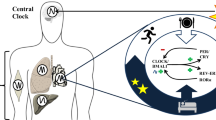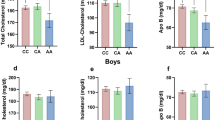Abstract
Introduction:
The success of obesity therapy is dependent on the genetic background of the patient. Circadian Locomotor Output Cycles Kaput (CLOCK), one of the transcription factors from the positive limb of the molecular clock, is involved in metabolic alterations.
Objective:
To investigate whether five candidate polymorphisms from CLOCK were associated with anthropometric, metabolic measures and weight loss in response to a behavioural weight reduction programme based on the Mediterranean diet.
Methods:
Five hundred overweight/obese subjects, aged 20–65 years, who attended outpatient clinics specializing in obesity, were studied. Anthropometric, biochemical and dietary intake variables were analysed. Effectiveness of the programme and weight loss progression during 28 weeks of treatment was assessed.
Results:
Four of five CLOCK SNPs selected were significantly associated with obesity variables (P<0.05). The genetic variation in the rs1801260 CLOCK was associated with obesity at baseline and also affected weight loss. Patients with the variant allele (G) lost significantly less weight i(P=0.008) compared with wild type. Repeated measures analysis showed that weight loss over time was significantly different between rs1801260 CLOCK variations (P=0.038). Carriers of the G allele displayed greater difficulty in losing weight than non-carriers. In this particular polymorphism, the frequency of short-time sleepers (⩽6 h per day) was greater in minor allele carriers than in non-carriers (59% vs 41%; P<0.05). CLOCK polymorphisms were also associated with significant differences in total plasma cholesterol at the completion of dietary treatment (P<0.05).
Conclusions:
We have replicated previous studies showing a relationship between CLOCK gene polymorphisms and obesity. CLOCK rs1801260 SNP may predict the outcome of body weight reduction strategies based on low-energy diets.
This is a preview of subscription content, access via your institution
Access options
Subscribe to this journal
Receive 12 print issues and online access
$259.00 per year
only $21.58 per issue
Buy this article
- Purchase on Springer Link
- Instant access to full article PDF
Prices may be subject to local taxes which are calculated during checkout



Similar content being viewed by others
References
Hainer V, Zamrazilová H, Spálová J, Hainerová I, Kunesová M, Aldhoon B et al. Role of hereditary factors in weight loss and its maintenance. Physiol Res 2008; 57: S1–15.
Corella D, Qi L, Sorlí JV, Godoy D, Portolés O, Coltell O et al. Obese subjects carrying the 11482G>A polymorphism at the perilipin locus are resistant to weight loss after dietary energy restriction. J Clin Endocrinol Metab 2005; 90: 5121–5126.
Marti A, Moreno-Aliaga MJ, Zulet A, Martínez JA . Advances in molecular nutrition: nutrigenomics and/or nutrigenetics. Nutr Hosp 2005; 20: 157–164.
Haupt A, Thamer C, Machann J, Kirchhoff K, Stefan N, Machicao F et al. Impact of variation in the FTO gene on whole body fat distribution, ectopic fat and weight loss. Obesity 2008; 16: 1969–1972.
Aberle J, Flitsch J, Beck NA, Mann O, Busch P, Peitsmeier P et al. Genetic variation may influence obesity only under conditions of diet: analysis of three candidate genes. Mol Genet Metab 2008; 95: 188–191.
Sørensen TI, Boutin P, Taylor MA, Larsen LH, Verdich C, Petersen L et al. NUGENOB Consortium. Genetic polymorphisms and weight loss in obesity: a randomised trial of hypo-energetic high- versus low-fat diets. PLoS Clin Trials 2006; 1: e12.
Garaulet M, Madrid JA . Chronobiology, genetics and metabolic syndrome. Curr Opin Lipidol 2009; 20: 127–134.
Fuller PM, Lu J, Saper CB . Differential rescue of light- and food-entrainable circadian rhythms. Science 2008; 230: 1074–1077.
Turek FW, Joshu C, Kohsaka A . Obesity and metabolic syndrome in circadian Clock mutant mice. Science 2005; 308: 1043–1045.
Rudic RD, McNamara P, Curtis AM . BMAL1 and CLOCK, two essential components of the circadian clock, are involved in glucose homeostasis. PLOS Biol 2006; 2: e377.
Scott EM, Carter AM, Grant PJ . Association between polymorphisms in the Clock gene, obesity and the metabolic syndrome in man. Int J Obes 2008; 32: 658–662.
Sookoian S, Gemma C, Gianotti TF, Burgueño A, Castaño G, Pirola CJ . Genetic variants of Clock transcription factor are associated with individual susceptibility to obesity. Am J Clin Nutr 2008; 87: 1606–1615.
Garaulet M, Pérez-Llamas F, Zamora S, Tébar FJ . Weight loss and possible reasons for dropping out of a dietary/behavioural programme in the treatment of overweight patients. J Hum Nutr Diet 1999; 219–227.
Corbalán MD, Morales EM, Canteras M, Espallardo A, Hernández T, Garaulet M . Effectiveness of cognitive-behavioral-therapy based on the Mediterranean diet for the treatment of obesity. Nutrition 2009. (in press)AQ.
Serra-Majem L, Aranceta J . SENC working group on nutritional objectives for the Spanish population. Spanish Society of Community Nutrition. Nutritional objectives for the Spanish population. Consensus from the Spanish Society of Community Nutrition. Public Health Nutr 2001; 4: 1409–1413.
Ferrario VF, Sforza C, Schmitz JH, Miani A, Taroni G . Fourier analysis of human soft tissue facial shape: sex differences in normal adults. J Anat 1995; 187: 593–602.
Perez-Llamas F, Garaulet M, Herrero F, Palma JT, Perez de Heredia F, Marin R et al. Multivalent informatics application for studies of the nutricional status of the population. Assessment of food intake. Nutr Hosp 2004; 19: 160–166.
Mataix J, Mañas M, Llopis J, Martinez E . Tabla de composición de alimentos españoles (Table of composition of Spanish foods), 1995. Instituto de Nutrición y tecnología. Universidad de Granada: Spain.
de Bakker PI, Yelensky R, Pe'er I, Gabriel SB, Daly MJ, Altshuler D . Altshuler efficiency and power in genetic association studies. Nat Genet 2005; 37: 1217–1223.
Caucasian European Utah data. Internet www.hapmap.org.
HelixTree Manual 5 3 0 Internet http://goldenhelix.com/HelixTreeManual/compositehaplotypemethodchm.html x133–75400023.7).
Marinescu VD, Kohane IS, Riva A . MAPPER: a search engine for the computational identification of putative transcription factor binding sites in multiple genomes. BMC Bioinform 2005; 6: 79.
Gruber AR, Lorenz R, Bernhart SH, Neuböck R, Hofacker IL . The Vienna RNA Websuite. Nucleic Acids Res 2008; 36 (Web Server issue): W70–W74 Internet http://rna.tbi.univie.ac.at/cgibin/RNAfold.cgi).
Iwase T, Kajimura N, Uchiyama M . Mutation screening of the human Clock gene in circadian rhythm sleep disorders. Psychiatry Res 2002; 109: 121–128.
Monteleone P, Tortorella A, Docimo L . Investigation of 3111T/C polymorphism of the CLOCK gene in obese individuals with or without binge eating disorder: association with higher body mass index. Neurosci Lett 2008; 435: 30–33.
Hamet P, Tremblay J . Genetics of the sleep–wake cycle and its disorders. Metabolism 2006; 55 (Suppl 2): S7–S12.
Kohler HP, Grant PJ . Plasminogen-activator inhibitor type 1 and coronary artery disease. N Engl J Med 2000; 342: 1792–1801.
Gomez-Abellan P, Hernandez-Morante JJ, Lujan JA . Clock genes are implicated in the human metabolic syndrome. Int J Obesity 2008; 32: 121–128.
Hernandez-Morante JJ, Gomez-Santos C, Milagro F . Expression of cortisol metabolism-related genes show circadian rhythmic patterns in human adipose tissue. Int J Obes 2009.
Benedetti F, Radaelli D, Bernasconi A, Dallaspezia S, Falini A, Scotti G, Lorenzi C et al. Clock genes beyond the clock: CLOCK genotype biases neural correlates of moral valence decision in depressed patients. Genes Brain Behav 2008; 7: 20–25.
Benedetti F, Dallaspezia S, Fulgosi MC, Lorenzi C, Serretti A, Barbini B et al. Actimetric evidence that CLOCK 3111 T/C SNP influences sleep and activity patterns in patients affected by bipolar depression. Am J Med Genet B Neuropsychiatr Genet 2007; 144B: 631–635.
Lee HJ, Paik JW, Kang SG, Lim SW, Kim L . Allelic variants interaction of CLOCK gene and G-protein beta3 subunit gene with diurnal preference. Chronobiol Int 2007; 24: 589–597.
Van Cauter E, Knutson KL . Sleep and the epidemic of obesity in children and adults. Eur J Endocrinol 2008; 159 (Suppl 1): S59–S66.
Acknowledgements
This work was supported by the Government of Education, Science and Research of Murcia (Project BIO/FFA 07/01–0004) and by The Spanish Government of Science and Innovation (projects AGL2008–01655/ALI) and by NIDDK Grant DK075030, as well as by contracts 53-K06–5–10 and 58–1950–9–001 from the US Department of Agriculture Research Service.
Author information
Authors and Affiliations
Corresponding author
Rights and permissions
About this article
Cite this article
Garaulet, M., Corbalán, M., Madrid, J. et al. CLOCK gene is implicated in weight reduction in obese patients participating in a dietary programme based on the Mediterranean diet. Int J Obes 34, 516–523 (2010). https://doi.org/10.1038/ijo.2009.255
Received:
Revised:
Accepted:
Published:
Issue Date:
DOI: https://doi.org/10.1038/ijo.2009.255
Keywords
This article is cited by
-
Sex-dependent relationship of polymorphisms in CLOCK and REV-ERBα genes with body mass index and lipid levels in children
Scientific Reports (2023)
-
Identification of the Relationship Between DNA Methylation of Circadian Rhythm Genes and Obesity
Biochemical Genetics (2023)
-
Potential protective effect against SARS-CoV-2 infection by APOE rs7412 polymorphism
Scientific Reports (2022)
-
The association between sleep health and weight change during a 12-month behavioral weight loss intervention
International Journal of Obesity (2021)
-
Reproducibility and associations with obesity and insulin resistance of circadian-rhythm parameters in free-living vs. controlled conditions during the PREVIEW lifestyle study
International Journal of Obesity (2021)



